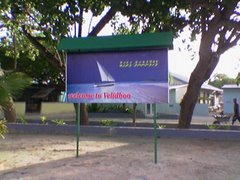Report: Soodh
President Maumoon Abdul Gayoom in his address given at the UN organized Bali Sumit on climate change has warned that, should the international community fail in its fight against climate change, the entire world would face sufferings that would far exceed the nightmare of the December 2004 Asian Tsunami.
Speaking at yesterday morning’s Opening of the High-Level Segment of the UN Climate Change Conference in Bali, Indonesia, the President said that climate change must be viewed not only as a danger to natural systems, but also as a direct threat to human survival and well-being. He added that the negotiation process must not be viewed as a traditional series of governmental trade-offs, but as an urgent international effort to safeguard human lives, homes, rights and livelihoods. “Failure, therefore, is not an option”, the President stressed.
President Gayoom noted that the impacts of climate change would be felt sooner, rather than later, in every nation, every community, and every neighborhood, and that these impacts would pose huge economic, social and political challenges for all countries. Further, he said that the Least Developed Countries (LDC) and Small Island Developing States (SIDS) would be faced with a much greater challenge than the rest of the world.
Focusing on the Conference, the President highlighted that the Bali Process must have a clear long-term target to stabilize the climate system, and ensure that temperature rises are reined in to reasonable levels. “Even a 2degree centigrade increase compared to pre-industrial levels would have devastating consequences on Small Island States”, he noted.
Adaptation must be at the heart of a post-2012 climate agreement, and that the UNFCCC adaptation fund must be adequately resourced and easily accessible to the Small Island Developing States said President Gayoom.
Reiterating the commitment of the SIDS to advancing negotiations within the UNFCCC towards a global and comprehensive agreement to stabilize the climate system, the President urged that this work must be completed by 2009 at the very latest. He also called for the adoption of the Bali Roadmap for negotiations, with clear, time-bound milestones up to Copenhagen.
President Gayoom noted that it was twenty years ago that he had first spoken at the UN General Assembly on the dangers that climate change poses to the Maldives and other Small Island Nations.
“I was focusing then on the prospect of an impending catastrophe. Today, that catastrophe is looming large on the horizon. Sea-level data over the past decade confirm our worst fears. Fears that, without immediate action, the long-term habitation of our tiny islands is in serious doubt” Said President Gayoom.
President recalled the coral bleaching incident of 1987 and the simultaneous sea swells on 70 islands earlier this year. He also expressed deep concern over the recent mysterious deaths of hundreds of thousands of fish in Maldivian waters.
He also noted with alarm that over half of the islands in the archipelago were eroding at an alarming rate. He added that, in some cases, island communities had been relocated to safer islands.
President Gayoom said “indeed, climate change has now become a daily reality in the Maldives and other Small Island States. Our severe lack of adaptive capacity, including financial, technical, and institutional resources means that we are ill-prepared to deal with these multiple threats. All the while, the impending long-term effects of sea-level rise are drawing ever closer.”
President noted that the goal today must be to protect the most vulnerable Parties to the Convention on Climate Change, both in the short- and in the long-term. He also called for people to be reinstated back at the heart of the climate change process. Further, he noted that, last month; Maldives and other Small Island Developing States had adopted the Male’ Declaration on the Human Dimension of Global Climate Change.
President then presented to the Conference the SAARC Declaration on Climate Change. He called on the delegates to consider in their deliberations the sentiments of the 1.5 billion people in the South Asian region. On the concerns faced by South Asia, the President said that many people in the region were being adversely impacted, and in many cases displaced as a consequence of sea-level rise, river bank erosion, drought, severe storms and cyclones, accelerated melting of the Himalayan glaciers and permanent inundation.
Congratulating the IPCC on winning the coveted Nobel Peace Prize for this year, the President highlighted that, for over a decade, the IPCC had delivered definitive and unequivocal scientific proof on the many facets of global climate change. The Nobel Prize, he said, was therefore a fitting recognition of IPCC’s enormous contribution to the climate change issue over many years.
Speaking on the importance of the recent Fourth Assessment Report of the IPCC, President Gayoom said that the Report was a powerful warning of where complacency could take the world, and called on policymakers to heed that warning.
“There can be no more delay, nor more distractions. After all, there is no more time. Let us ensure that, two years from now, we look back at today as an opportunity grasped, and not as another one that had got away. Here in Bali, we have the right ingredients in setting, timing and leadership for a historic change said President Gayoom. The important question, the President said, was whether there was the will to fight climate change. He added that the answer had to be a resounding yes, as the people deserved it.
In conclusion, President Gayoom quoted from the song written by President Yudhoyono of Indonesia, which read: “We are gathered here in Bali, to save our planet. We are united here in Bali; for a better life, a better world, for you and me.”


No comments:
Post a Comment